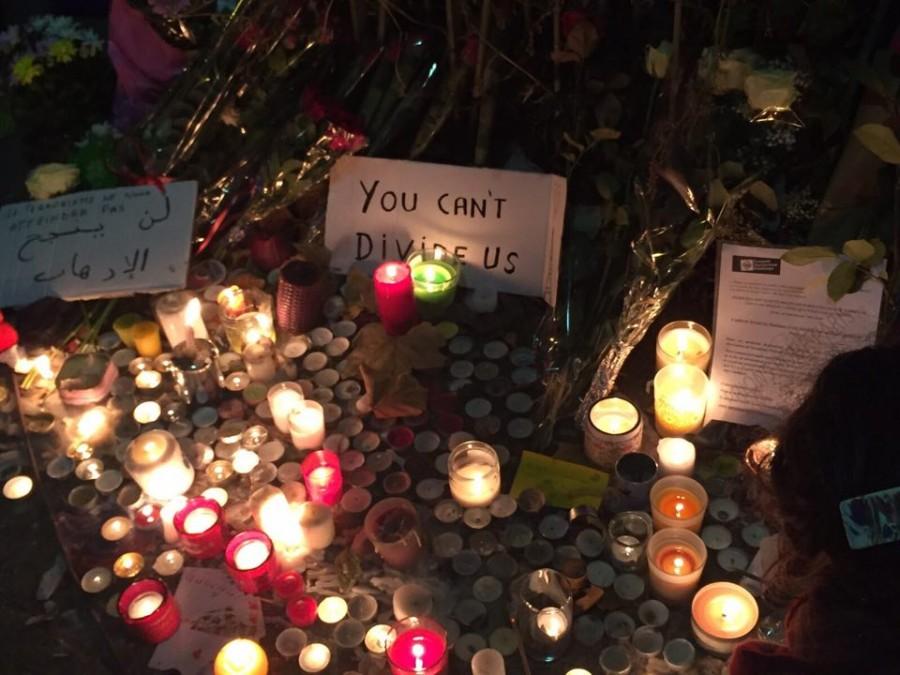The day was over. Paris nightlife was starting. Fans gathered at the Stade de France to watch a long-awaited match between France and Germany. Friends met up in bars around the city, ready to relax and bring in the weekend. Concert-goers crowded into the Bataclan Theater to listen to the Eagles of Death Metal.
Cheers for the national team were briefly interrupted by a loud explosion. Chatter and clinking glasses replaced with screams as windows broke and bodies fell. Fans singing along were cut short by the staccato chatter of guns.
The night would later be described as the bloodiest in Paris since its liberation 71 years ago.
A group of Islamic State militants carried out six attacks throughout Paris Friday, Nov. 13, killing 129 people as of press time with hundreds more injured.
Kameron Harris, a senior organizational and corporate communication major from UTEP, arrived in Paris as this was unraveling. She is studying in Barcelona, but had made plans to visit the French capital.
“I couldn’t wait to explore and see all the beautiful things Paris has to offer,” Harris said. “My friends and I had so many plans for the weekend that we couldn’t wait to get to our hotel, drop our luggage off and start our adventure.”
An adventure soon cut short. As Harris and her friends were visiting a Christmas market, she says the calm and cheerful scene soon changed.
“It was gorgeous, hundreds of booths set up with Christmas music playing, food, an ice skating rink, it was truly a winter wonderland in Paris,” she said. “Moments later, things changed instantly. My friends and I saw six police cars going down one direction of the street with great urgency.”
The attacks had started, dozens had died and Paris was responding. Harris recalls policemen running to their cars frantically heading towards the area of the attacks in full force.
“We heard sirens and police cars going the opposite direction seconds later,” Harris said. “That’s when we knew something was extremely wrong.”
One team of IS attackers wearing suicide vests exploded outside the Stade de France, killing only one civilian in the least deadly attack of the night. Another team went around the city streets, shooting at restaurant and bar patrons, ending dozens of lives with lead and fire.
As word of the attacks spread, citizens and tourists tried everything they could to get back home. Panic filled the streets as people ran, trying to get into cars and safety. Harris said she fell back on faith.
“It took us a while to get a taxi, but when we finally got in, I laid down in the back seat and just prayed that we make it back to our hotel,” she said. “We couldn’t believe this was happening.”
Not everyone was safe. The final outfit of jihadists had taken the Bataclan Theater and were holding people hostage after killing scores.
Harris arrived at her hotel in the 11th arrondissement, 10 minutes from the concert hall where police were laying siege against the Islamic State combatants.
“The hotel doors were locked, but the staff let us in immediately,” Harris said. “Everybody in the lobby was surrounding the TVs, crying, on the phone, scared for what was coming next.”
Harris wasn’t alone in being scared. Fear crossed borders as others heard about the attacks. Family and friends were desperately trying to reach Harris to make sure she was safe. She recalls the calm fear in her mother’s voice when they finally were able to get in contact with each other.
It would be the start of a long night, as French authorities went around and told everyone to stay inside. The orders would stand for 29 hours.
“I honestly didn’t know what was going to happen next,” Harris said. “Knowing that all this was happening 10 minutes away from our hotel was mind-blowing.”
Life quickly returned to the streets of Paris once people were allowed outside and resumed their weekend activities. Harris headed to the airport on her way back to Barcelona at 2 p.m., but there was nothing normal about that Sunday afternoon.
“It was very eerie, everybody was extremely quiet and the atmosphere just didn’t feel right,” Harris said. “Being in large crowds, you could tell everybody was on edge and was very aware of their surroundings.”
Markets opened, kitchens rang with the sounds of pots and pans, and the smell of coffee wafted through the streets, but the attacks of November 13th had left their mark. Vigils were held for the lost souls as memorials sprang up around the city.
“On are way to the airport on Sunday night we passed by the restaurant that was attacked,” Harris said. “It was absolutely heartbreaking, people crying and laying down flowers, signs and lighting candles.”
The night had already burned itself into the chronicles of a country with a long-storied history and the minds of those who lived it.
“I wouldn’t want anybody to experience anything like this,” Harris said. “It was the scariest day of my life, it will be with me forever.”
Julio Cesar Chavez may be reached at [email protected].










